| Author |
Message |
    
Tom Stranko
| | Posted on Friday, January 02, 2004 - 07:04 pm: | 




|
This is the unknown rusted solid engine that my friend cleaned and painted |
    
Tom Stranko
| | Posted on Friday, January 02, 2004 - 07:04 pm: | 




|
 |
    
Tom Stranko
| | Posted on Friday, January 02, 2004 - 07:06 pm: | 




|
 |
    
Tom Stranko
| | Posted on Friday, January 02, 2004 - 07:07 pm: | 




|
 |
    
Tom Stranko
| | Posted on Friday, January 02, 2004 - 07:09 pm: | 




|
 |
    
andrew
| | Posted on Friday, January 02, 2004 - 11:27 pm: | 




|
Imagine what it would be like to try to do the alignment in the boat! |
    
Richard Day
| | Posted on Saturday, January 03, 2004 - 09:54 pm: | 




|
I wonder if that is not an Aristos Motor. See the Paragon ad in Motor Boat Dec 10, 1912 page 201 |
    
Richard Day
| | Posted on Tuesday, January 06, 2004 - 08:11 am: | 




|
Further search regarding this jewel reveals that Max Homfeld in his listing of "753 Manufacturers of Inboard Marine engines" on page 1. under Manufacturer's Name lists no. 24 as Aristox Co. New York, NY. His sources are listed as the Jerry Dunn collection of Willmington, NC. and Lloyd's Register of Yachts. The Dunn collection consists of about 225 early marine engine catalogs and a great many early catalogs of marine supply companies and early magazines. As I understand the situation Jerry found this collection in an empty house he was asked to sell and recognized the significance of this immence trove. He donated it to the Chesapeake Bay Marine Museum in St. Michaels, MD. Max found in the back of the 1912 Lloyd's a listing of 257 marine engine builders.
Max notes that a reference to Aristox is also found in Motor Boating July 1913; See Black Rock.
While Aristos and Aristox are not precisely the same the similarity suggest to me a further search might settle this question. I do not have a copy of Motor Boat for July 1913 but I will search the CMM library on my next visit. There was a picture in the Gas Engine Magazine of one of these engines as I remember it it was found on a Great Lakes beach in poor condition but I have no idea where to even start looking for that reference. |
    
andrew
| | Posted on Tuesday, January 06, 2004 - 09:50 am: | 




|
It also looks like the three cylinder version of this engine...

 |
    
Tom Stranko
| | Posted on Tuesday, January 06, 2004 - 01:13 pm: | 




|
The man who took these pictures and painted the engine (which was indeed found rusting away on a Michigan beach) has some Xerox literature which
he said (per the museum that ownes the motor) that it is an Aristox. I will forward to this thread. The Van Auken seems to be the same engine (how many designs like this could there be?) so I suppose it could be re-badged or re-marketed. It was apparently a Government life-saving boat engine. You could turn on a dime by running one prop FWD and the other REV.
What I want to know is did the engine have a power sharing system like most multi crankshart engines? I have a hard time believing it's that cross shaft between the transmissions. |
    
keith
| | Posted on Tuesday, January 06, 2004 - 03:51 pm: | 




|
Tom. Is it possible the cross shaft operated a cluching system? So you could dissengage one side to turn without reversing one side.
Keith |
    
Tom Stranko
| | Posted on Tuesday, January 06, 2004 - 06:28 pm: | 




|
My friend said he thought there was a common combustion chamber for each cylinder pair. That would seem to mean that the 2 pistons would come up to TDC and fire together. If the two cranks aren't syncd up somehow there would be no exact compression ratio (or HP for that matter).
I guess that cross shaft could have two whopper bevel gear sets on each end and all the transmission functions or FWD, REV would be aft of that point, so to speak. I just noticed that the Van Auken (by Andrew) is a 4 cylinder (8 pistons) Yikes! |
    
Tom Stranko
| | Posted on Thursday, January 08, 2004 - 07:48 pm: | 




|
I got the Xerox of the Aristox literature. I'm sending in some scans of a top drawing and a front drawing (cut-aways). They say the cranks were positively synchronized by that cross shaft.
The intake was on the left set of cylinders and the exhaust on the right side. |
    
Tom Stranko
| | Posted on Thursday, January 08, 2004 - 07:50 pm: | 




|
 |
    
Tom Stranko
| | Posted on Thursday, January 08, 2004 - 07:51 pm: | 




|
 |
    
Tom Stranko
| | Posted on Thursday, January 08, 2004 - 07:54 pm: | 




|
It seems like the swept volume and the compression ratio must have been pretty high
in this engine. The catalog also mentions they had 4 cycle models available. |
    
john
| | Posted on Saturday, March 06, 2004 - 11:35 pm: | 




|
hi
get on the net and look up the words napier deltic
will give arough idea of how it works |
    
Richard G. Ryder
| | Posted on Tuesday, March 16, 2004 - 08:39 am: | 




|
An engraving of an Aristox motor was used in my book entitled "Old Harbor Station - Cape Cod' published in 1990. It came from an old boating magazine advertisement found at the Mystic Seaport reference library. It clearly said it was a 12 HP, 2 cycle, three cylinder engine with a top speed of 675 RPM. It weighed 500 lbs. It came from the Black Rock Motor Co. in Bridgeport, CT. The motor found under the clear cold Lake Michigan water was initially identified by looking at my book illustration. The motor was installed in a 26' Beebe McClellan power surfboat kept at the Old Harbor Life Saving Station in Chatham, Mass. A similar motor, or maybe the same one, has been restored and is on display at the Michigan Maritime Museum in South Haven, MI. I am interested in knowing if there is another one out there somewhere. The Old Harbor station has been moved to Provincetown, MA and is a US Life Saving Service museum owned by the Cape Cod National Seashore. It would be neat to have an engine for display there. R. G. Ryder, North Eastham, MASS. 02651-1189 |
    
andrew
| | Posted on Sunday, April 25, 2004 - 11:54 pm: | 




|
A similar engine was posted on this site approximately 2-2 1/2 years ago, I believe was found at a mining site in Alaska |
    
raymond
| | Posted on Thursday, June 17, 2004 - 06:33 pm: | 




|
ANDREW,
that is a most interesting little engine. The bevel gear connecting shaft with the bent bronze gear also has a vernier coupling by which the lap and lead of the two crankshafts are adjusted. The gear drives the low tension magneto, to the front of that gear is the water pump eccentric, the pump eccentric strap. rod and piston are missing.There is no power transmitted thru that shaft, it is just for timing and keeping the two crank shafts in the right phase.The VAN AUKEN engine might have been made under licence to ARISTOS. there are some differences.but they are in reality just a pair of conjoined engines and have similarities to the German "JUNKERS" At the spark plug location , one is probably a 1/2 inch gas thread for the spark plug and the other larger a 3/4 tapped core plug, that goes into the water jacket. They would have been bronze, thats why they are missing. In the transmission case, although not shown will be a pair of cone clutches giving ahead and astern drive to the output shafts. This would make a great restoration project. |
    
raymond
| | Posted on Thursday, June 17, 2004 - 06:40 pm: | 




|
TOM STRANKO,
"JUNKERS" built a 4 crankshaft--24 cylinder--48 piston diesel aircraft engine something like 3.000 hp. The russians stole it and took it away/ The "NAPIER-DELTIC" only had 3 c/shafts. |
    
Tom Stranko
| | Posted on Saturday, June 19, 2004 - 12:22 pm: | 




|
That must be something to see (was it a prototype?). In the Smithsonian Air & Space Museum there are some big non-gas turbine aircraft engines. I believe I saw the piston engine from the B-36 (RB58??) on display. Mostly you see pictures of the B-36 with the turboprop retrofits that must have been done in the early '50's. The original piston engine had a carburator top forward that had an air opening big enough for a small child to crawl into. There is a P-39 (Bell AeroCobra?) engine in the Glen Curtis museum in upstate NY. What a thing that is; the rear mounted inline piston engine has a big gear box for the prop shaft that runs below the pilot so the (30MM? 40MM?) tank busting cannon barrel can shoot right out the center of the propellor.
When you see the whole setup layed out it's hard
to imagine the mechanics job being anything but a nightmare.
T |
    
Scott Peters
Visitor
| | Posted on Wednesday, November 24, 2004 - 02:55 pm: | 




|
I saw ads for the Van Auken-Clevauc Co., Yonkers, New York, featuring the Van Auken motor in Scientific American, May 13, 1905, p. 396, also before and after that date in 1905. Hope it helps identify the timeframe. |
    
richarddurgee
Senior Member
Username: richarddurgee
Post Number: 633
Registered: 11-2001

| | Posted on Sunday, November 28, 2004 - 11:50 am: | 




|
ARISTOS Motor Boating Dec 1913
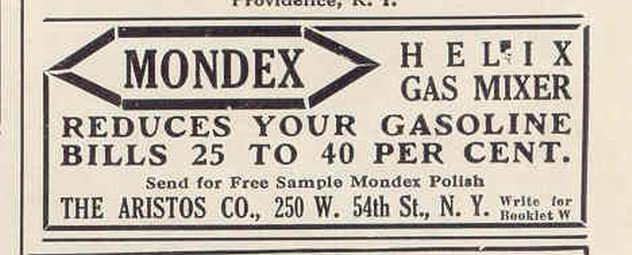 |
    
richarddurgee
Senior Member
Username: richarddurgee
Post Number: 634
Registered: 11-2001

| | Posted on Sunday, November 28, 2004 - 01:09 pm: | 




|
Van Auken 1909 ads
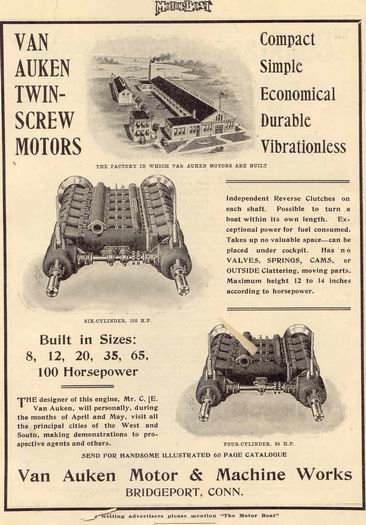
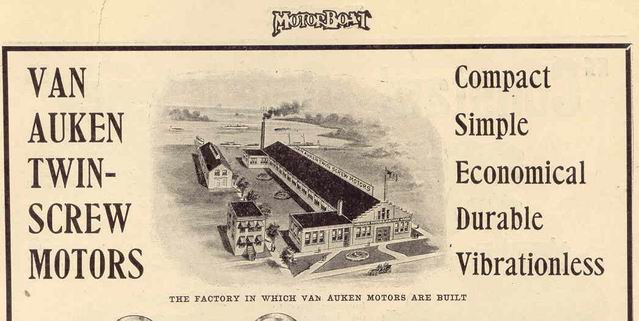
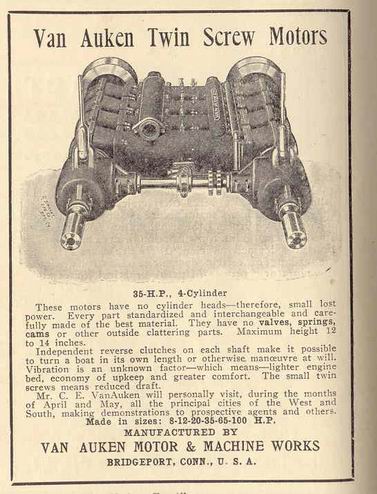 |
    
richarddurgee
Senior Member
Username: richarddurgee
Post Number: 635
Registered: 11-2001

| | Posted on Sunday, November 28, 2004 - 01:49 pm: | 




|
Van Auken-Clevauc Co. 1906 ad
Different manifold system and no output gear boxes
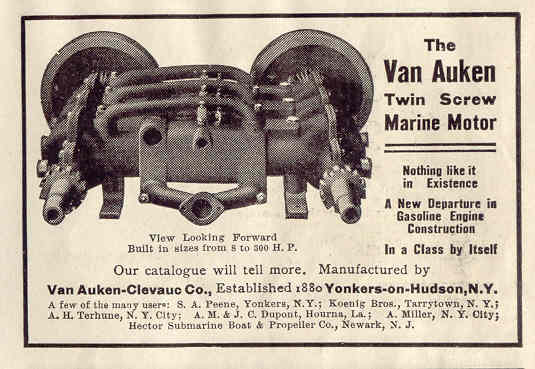 |
    
richarddurgee
Senior Member
Username: richarddurgee
Post Number: 2208
Registered: 11-2001
| | Posted on Sunday, October 11, 2009 - 11:47 am: | 




|
*
Van Auken Discusion 2004
** |
    
kerrigan
Member
Username: kerrigan
Post Number: 26
Registered: 06-2008

| | Posted on Sunday, October 11, 2009 - 12:35 pm: | 




|
Tom Stranko:
Google Bell P-39 to learn more about the Airacobra and its Allison V-16 engine. |
    
kerrigan
Member
Username: kerrigan
Post Number: 27
Registered: 06-2008

| | Posted on Sunday, October 11, 2009 - 12:40 pm: | 




|
Correction
The Allison engine was a V-12 not a V-16. That was Cadillac that used a V-16. |


